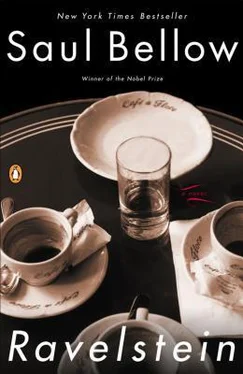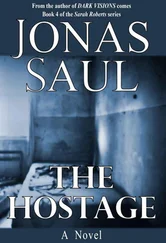These were some of his fundamental assumptions, and the foundations of his teacher's vocation. If these are left out of my account of his life we'll see only his eccentricities or foibles, his lavish, screwy purchases, his furnishings, his vanities, his gags, his laugh-paroxysms, the _marche militaire__ he did as he crossed the quadrangle in his huge fur-lined coat of luxurious leather-I knew only one other such coat. Gus Alex, a hit man and a hoodlum, wore a long, beautifully tailored mink coat on Lake Shore Drive where he lived and where he walked his little dog.
It used to be said now and then that his favorite students got a "charge" out of Ravelstein-that he was funny, a hoot. The charge, however, was only superficially funny or entertaining-a vital force was transmitted. Whatever the oddities were, they fed his energy, and this energy was spread, disseminated, bestowed.
I am doing what I can with the facts. He lived by his ideas. His knowledge was real, and he could document it, chapter and verse. He was here to give aid, to clarify and _move__, and to make certain if he could that the greatness of humankind would not entirely evaporate in bourgeois well-being, et cetera. There was nothing of the average in Ravelstein's life. He did not accept dullness and boredom. Nor was depression tolerated. He did not put up with low moods. Troubles when he had them were physical. His dental problems at one time were severe. He was persuaded at the university clinic to have implants put in; these went through the gums into the sockets, into the bone of the jaw. This operation was bungled and he suffered agonies at the hands of the surgeon. He walked the floors all night. Then he tried to get the implanted posts pulled out, and this was even more painful than the driving in.
"This is what comes of taking a cabinet maker's approach to the human head," he told me.
"You should have gone to Boston for this. Boston oral surgeons are supposed to be the best."
"Never put yourself in the hands of any lousy specialists. You'll be sacrificed on the altar of their thee-ah _technics__."
He was impatient with hygiene. There was no counting the cigarettes he lit in a day. Most of them he forgot, or broke. They lay like sticks of chalk in his CEO glass ashtrays. But then the organism was imperfect. His biological patchiness was a given-faulty, darkened heart and lungs. But to prolong his life was not one of Ravelstein's aims. Risk, limit, death's blackout were present in every living moment. When he coughed you heard the sump at the bottom of a mine shaft echoing.
I stopped asking Abe about the implants in his jawbone. I assumed that there were pangs now and then, and I thought of them as part of the psychophysical background.
Irregular in his habits and his hours, he seldom had a full night's sleep. Class preparation often kept him up. To lead his Oklahoma, Texas, or Oregon students through a Platonic dialogue, you needed exceptional skills as well as esoteric knowledge. Abe was not a late riser. Nikki on the other hand watched Chinese kung fu thrillers all night long and often slept until 2 p.m. Both Abe and Nikki were basketball fans. They seldom missed the Chicago Bulls on NBC.
When an important game was played, Ravelstein invited his graduate students to his apartment. He ordered pizza. Two delivery boys, carrying stacks of boxes, kicked at his door. The entry hall was filled with the hot smells of oregano, tomatoes, toasted cheese, pepperoni, and anchovies. Nikki presided over the cutting, using a sharp rolling blade. Slices were handed out on paper plates. Rosamund and I ate sandwiches made by Ravelstein with eager, un steady hands and cheerful shouts. There was something like a demonstration of extraordinary skill in the serving of the drinks, as though he had halted in the middle of a high wire with a tray of overfilled glasses. You didn't want to banter with him then.
The portable phone was usually sticking out of Abe's pocket. I can't remember what call he was expecting just then. Maybe one of his sources had inside information about President Bush's final decision to end the war in Iraq. I have an impression somehow of the President-long-faced, lean, and tall-intermittently interrupting the pregame action on the basketball court. Vast banks of spectators, full of light, all brilliantly colored, Michael Jordan, Scottie Pippen, Horace Grant filling the net with warm-up shots. Mr. Bush equally tall but without beauty in his movements. It may not have been Iraq at all, but another crisis. You know how television is: you can't tell the wars from the NBA events-sports, superpower glamour, high-tech military operations; this was keenly felt by Ravelstein. If he spoke of Machiavelli and the best way to deal with a defeated enemy it was because he was a teacher through and through. There were flashes also of General Colin Powell and of Baker, the Secretary of State. And then in the stadium the brief dimming of the vast lights-and after that the dramatic return of full illumination.
All of this put you in mind of the mass displays organized and staged by Hitler's impresario, Albert Speer: sports events and mass fascist rallies borrowed from each other. Ravelstein's young men were well up on basketball. In Michael Jordan, of course, they had a genius to watch. Ravelstein felt himself deeply and vitally connected with Jordan, the artist. He used to say that basketball stood with jazz music as a significant black contribution to the higher life of the country-its specifically American character. No less than bullfighters in Spain or tenors in Ireland or Nijinskys in Russia were the guards and forwards in the U. S. On that evening, in any case, President Bush had given the U. S. a military triumph; and Ravelstein, commenting on the black American servicemen, said what a credit they were to the country and to the U. S. military-how well-spoken they were on TV and how expert technically, how well they knew their jobs. For this he gave the Pentagon high marks.
For reasons of all sorts, Ravelstein was big on soldiers. He spoke with deep feeling about the American pilot shot down over North Vietnam who battered and bruised his own face, who deliberately broke his nose on the wall of his prison cell. This he did when he was told that he would have to appear with other prisoners on Ho Chi Minh's TV in order to denounce U. S. imperialism.
At his basketball parties, Ravelstein passed pizza slices among his graduate-student guests, his bald head swiveling toward the busy, colored TV screen behind him. His lot, his crew, his disciples, his clones who dressed as he did, smoked the same Marlboros, and found in these entertainments a common ground between the fan clubs of childhood and the Promised Land of the intellect toward which Ravelstein, their Moses and their Socrates, led them. Michael Jordan was now an American cult figure-small boys saved his apple cores as relics. A children's crusade might be possible even in the present age. Jordan, the papers said, had "bionic" powers. He could suspend himself in the air out of the reach of blockers, and you could trace his deliberations in his actions, with time enough to change hands while he soared-a man who earned $80 million a year, not a cult figure but a hero who moved the hearts of the masses.
Inevitably Ravelstein was seen by the young men he was training as the intellectual counterpart to Jordan. The man who introduced them to the powers and subtleties of Thucydides and analyzed the role of Alcibiades in the Sicilian campaign as no one else could-a man who expounded the _Gorgias__ to his seminar, literally in sight of the steel mills and the ash heaps and street filth of Gary, its ore boats coming and going across the water-could also hang in the air, levitating just like Jordan. A man of idiosyncrasies and kinks, of gobbling greed for penny candies or illegal Havana cigars, was himself a Homeric prodigy.
Читать дальше












